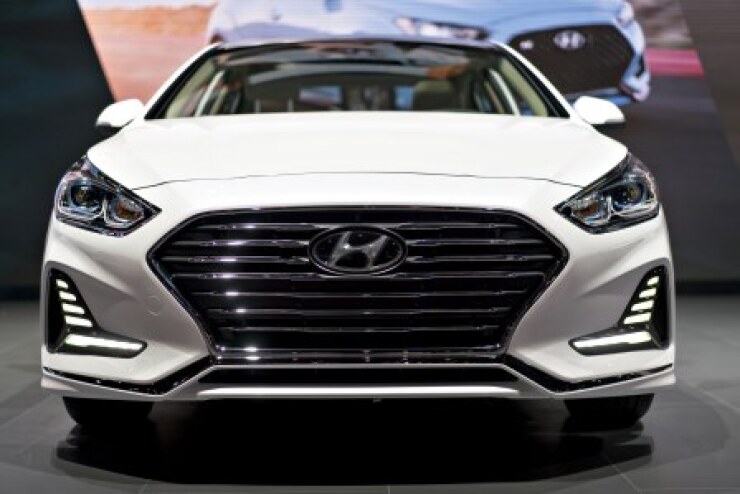Tighter underwriting standards first enacted by Hyundai Capital America in 2016 are paying off for the captive lender’s first 2019 prime auto-loan securitization.
S&P Global Ratings is expecting a net loss range of 1.45%-1.65% for the shelf life of the lender's next $1 billion Hyundai Auto Receivables Trust (HART) 2019-A transaction, according to a presale report issued Thursday. That compares favorably to the 1.55%-1.75% range for HCA's previous deal, the $701 million HART 2018-B series.
Fitch Ratings did not rate the 2018-B transaction, so it has nothing in comparison for its cumulative net loss 1.75%. But the ratings agency notes in its presale report that the 2019-A collateral pool has “slightly stronger” credit quality than recently issued HART transactions. It cites the weighted average FICO of 752, 12.6 months of seasoning, and “strong” model and segment diversification, according to Fitch. The percentage of loans to borrowers with FICOs over 750 has grown to 55% of the pool, up from 50.1% for the 2018-B transaction.
The transaction includes 58,430 loans with an average principal balance of $18,849 (the highest of any HCA transaction since 2015) and APR of 3.34%. The WA original terms are 66.2 months. The average original amount financed of $24,082 is the highest of any previous HART transaction.
The loans were drawn from HCA's managed portfolio, which stood at $13.4 billion as of December 2018, servicing 847,817 loans. The portfolio's servicing level is down from both the 2017 levels of $13.5 billion across 875,919 loans and $14.5 billion from 920,640 loans in 2016.
But 2016 was also when Hyundai buttoned down its underwriting criteria, in response to elevated loss levels detected early in HART 2016-A, according to S&P. "Series 2016-A and 2016-B are performing weaker than expected," with the 2016-A deal already nearing 2% total losses in less than 37 months of performance, S&P's presale report noted. "However, the series 2019-A pool has improved collateral characteristics" compared to those earlier deals.
HCA has since increased weighted average FICOs in transactions since 2017, issuing loans to higher-scoring borrowers while decreasing originations to borrowers with sub-700 FICOs. For example, the 2019-A deal has a 20.8% share of loans with FICO scores under 700, compared to 30.9% from HART 2016-A.
However, extended term contracts remain an elevated risk in the pool, covering 61.8% of the total loan balance. (Extended term loans over 61 months have historically had higher delinquency and loss rates in auto asset-backed securitizations.)

Another riskier trend is the rise in loan-to-value ratios up at 100.4%, higher compared to other recent deals. But Fitch notes the concentration of loans with LTVs under 100% total 45.9% of the pool, a “notable improvement” from 2018-B’s 53.7% share. LTVs over 100% potentially expose the trust to higher losses stemming from increased loss severity and weaker recoveries.
HART 2019-A is a pool of $1.1 billion in prime auto loans underwritten for new and used cars financed through U.S. Hyundai and Kia dealers. (HCA is 80% owned by Hyundai Motor America and 20% Kia Motors America.)
The collateral pool backs six classes of notes, including three triple-A rated tranches of senior notes. The Class A-2A/2B notes is a $320 million offering of fixed- and floating-rate notes due 2021, and sized equally to a Class A-3 tranche of notes due June 2023. A $78.6 million Class A-4 notes tranche has a May 2025 maturity.
The Class B notes, rated AA+ by Fitch and S&P, have a preliminary amount of $18.6 million of notes and the Class C notes (rated AA-) is $31.03 million, although S&P states the final sizes of the two subordinate tranches will be decided at closing.
A $240 million tranche of Class A-1 notes carry an A-1+ short-term rating from S&P and F1+ from Fitch.
The deal is being underwritten by SG Americas Securities.
The deal is HCA's second asset-backed transaction of 2019. In February, the lender sponsored a $711 million auto-lease securitization.





